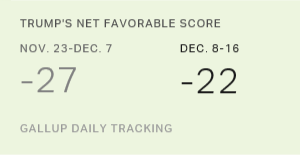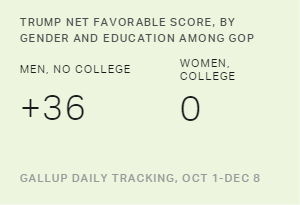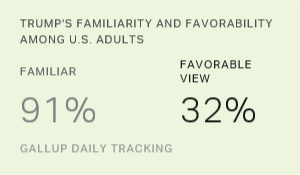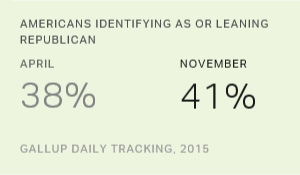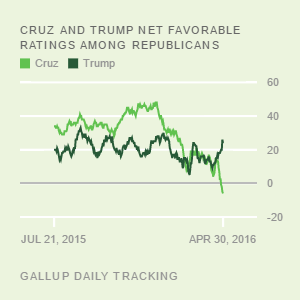Donald Trump's image among the overall U.S. population has trended up, not down, after his Dec. 7 recommendation that the U.S. prevent Muslims from coming into the country. The statement was met with extraordinary controversy -- even for Trump -- and most of his fellow Republican candidates, along with Democratic leaders, denounced it. Clearly, it would not have surprised many observers if Trump's image had taken a hit as a result.
But we can reject that hypothesis, at least based on data we have collected so far. Trump had a negative image among American adults to begin with, but it became slightly less so after his pronouncement, rather than more so. In the two weeks leading up to and including Dec. 7, Trump had a net favorable score among national adults of -27, based on a favorable percentage of 32% and an unfavorable percentage of 59%. That improved slightly to a net favorable of -22 (34% favorable, 56% unfavorable) for the nine days from Dec. 8 to Dec. 16.
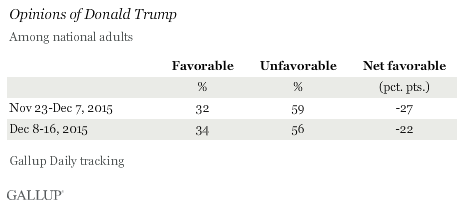
This improvement is slight, and it will take time to see what happens in the long run. Additionally, only one of the days of interviewing included in the more recent period followed Tuesday night's debate, so the update wouldn't reflect any effects of the debate.
Still, these results are based on robust sample sizes of 1,927 interviews in the Nov. 23-Dec. 7 period and 1,250 in the Dec. 8-16 period, and clearly allow us to reject the hypothesis that the controversial "Muslim ban" statement caused Americans to look more negatively at Trump than they had before.
The sample sizes are smaller when we look at Republicans and Democrats, making it too early to reach definitive conclusions about the impact of the statement on Trump's image among these two partisan groups. But we do see, based on the results so far, that Trump's image among Republicans and Republican-leaning independents did indeed edge down after the statement, with a seven-percentage-point drop in his net favorable rating. At the same time, his net favorable rating went up by 10 points among Democrats and Democratic-leaning independents. Not shown in the table below are the "pure independents" -- that small group of about 12% of the U.S. population who are independent and don't lean in either direction and/or who don't provide a party ID at all. These individuals' opinions of Trump also have improved since Dec 7.
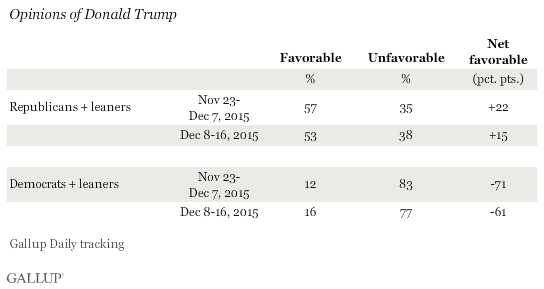
It's not clear to me why the Muslim ban controversy would make Democrats more positive about Trump than before, while making his image less positive among Republicans. These are all small changes, I should underscore, and it is going to take a while before we know if there is a lasting impact. Still, at this juncture, we can say that Trump has not helped himself with Republicans -- presumably his more immediate objective, since he has to win the GOP nomination before he can run in the general election.
Actually, of course, Trump at any time can decide to drop out of the GOP race and run as an independent.
But running as an independent assumes, at least in part, that Trump has some unique appeal to voters who are not strongly anchored to either party, the group he would need to peel off in a general election. Americans whose initial party self-identification is "independent" have opinions of Trump that are -- not surprisingly -- midway between those of Republicans and Democrats. For the entire period of Nov. 23-Dec. 16, independents' net favorable rating of Trump is -30. That compares with the +23 among "pure" Republicans and -67 among "pure" Democrats. He is also at -30 among those who remain once we ask independents if they lean toward one party or the other.
